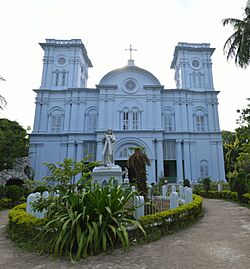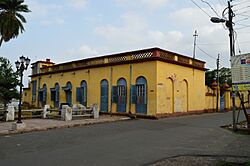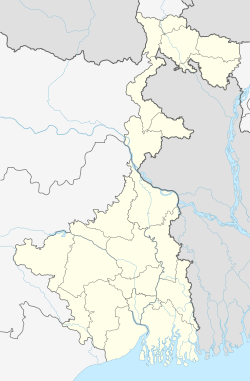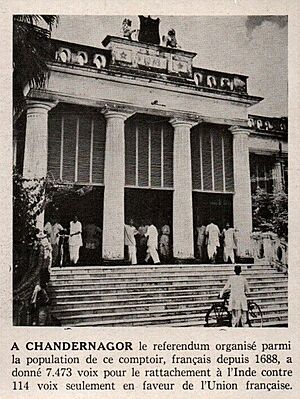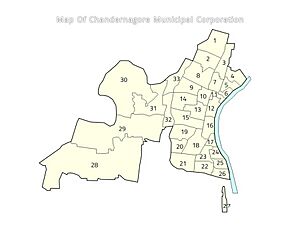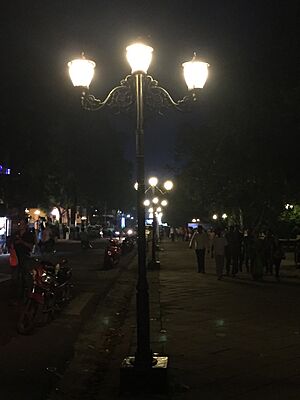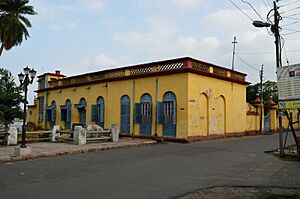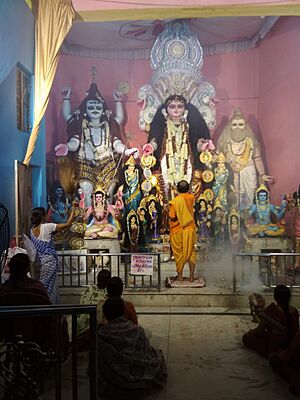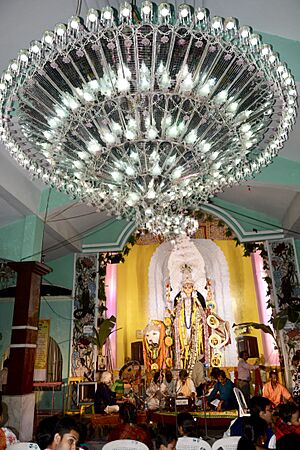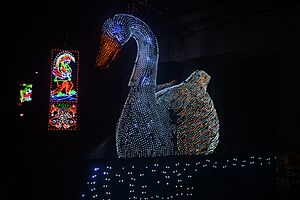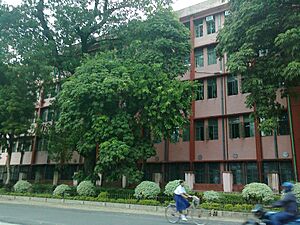Chandannagar facts for kids
Quick facts for kids
Chandannagar
চন্দননগর
Chandernagore
|
|
|---|---|
|
City
|
|
|
Clockwise from the top:
Église du Sacré-Cœur, Nandulal Temple, Tour de l'Horloge, Patal Bari, Institut de Chandernagor and Chandannagar Strand |
|
| Etymology: see Etymology | |
| Nickname(s):
Farasdanga
|
|
| Country | |
| State | |
| Division | Burdwan |
| District | Hooghly |
| Subdivision | Chandannagar |
| Municipal Corporation | Chandernagore |
| Metropolitan Area | Greater Kolkata |
| French Indian colony of the French colonial empire | 1696 |
| De facto transfer to India | 2 February 1951 |
| De jure transfer to India | 9 June 1952 |
| Incorporated in West Bengal | 2 October 1954 |
| Founded by | French East India Company |
| Named for | Bending of the Hooghly river |
| Government | |
| • Type | Municipal Corporation |
| • Body | Chandernagore Municipal Corporation |
| Area | |
| • Total | 19 km2 (7 sq mi) |
| Elevation | 9 m (30 ft) |
| Population
(2011)
|
|
| • Total | 166,867 |
| • Density | 8,780/km2 (22,700/sq mi) |
| Demonym(s) | Bengali: Chandannagari French: Chandernagorien(ne) English: Chandernagorean |
| Languages | |
| • Official | |
| • Former official | French |
| Time zone | UTC+5:30 (IST) |
| PIN |
712136, 712137, 712138
|
| Telephone code | +91 33 |
| Vehicle registration | WB |
| Lok Sabha constituency | Hooghly |
| MP | Rachana Banerjee (AITC) |
| Vidhan Sabha constituency | Chandannagar |
| MLA | Indranil Sen (AITC) |
| Website | http://heritagechandernagore.com/ |
Chandannagar (pronounced [tʃɔnd̪ɔn.nɔɡoɾ]), also known as Chandernagore, is a city in the Hooghly district of West Bengal, India. It's the main city of the Chandannagore subdivision and part of the larger Kolkata Metropolitan Development Authority area.
This city sits on the western bank of the Hooghly River. It was once one of the five important settlements of French India. You can still see old Indo-French buildings, like colonial bungalows, which show its unique history.
Contents
What's in a Name?
The name Chandannagar has two parts. Nagar means 'city'. The first part, Chandan, might come from a few ideas:
- Bengali word chand, meaning 'moon'. This could be because the Hooghly River bank here is shaped like a crescent moon.
- Bengali word chandan, meaning 'sandalwood'. People say the city was once a big trading spot for sandalwood.
- Chandi, which is the name of a goddess.
Before, the city was called Farasdanga. Faras means 'French' and danga means 'land' in Bengali.
A Glimpse into History
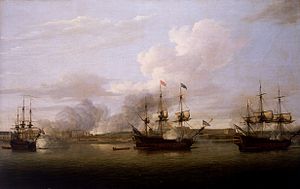
Chandannagar became a city during the time of European colonies in India. Old Bengali writings don't mention it, which suggests it was created later. Historians believe the French formed the city by joining smaller villages like Gondolpara, Boro, and Khalisani. The name "Chandernagor" first appeared in a letter in 1696.
The French East India Company gained control of the area in 1688. They paid 40,000 coins to the local ruler to build a factory. However, the first Frenchman to own land here was Du Plessis in 1673–74.
Chandannagar grew quickly as a French colony. In 1730, Joseph François Dupleix became the city's governor. During his time, over two thousand brick houses were built, and trade by sea became very active. The city's population reached about 100,000 people. Chandannagar was the main center for European trade in Bengal until 1756. It was a busy place for trading goods like indigo, silk, rice, and sugar. Fine clothes from Chandannagar were even sent to Europe!
One important person from this time was Indranarayan Chaudhari. He became very rich by working with the French trading company. When the East India Company took over his house in 1756, they found a huge amount of money and jewelry. The Nandadulal Temple, which he built, still has a secret room where he supposedly hid his wealth.
In 1756, a war started between France and Great Britain. On March 23, 1757, British forces led by Colonel Robert Clive and Admiral Charles Watson attacked and captured Chandannagar. The city's defenses and many houses were destroyed. After this, Calcutta became more important for trade.
Chandannagar was given back to the French in 1763. But the British took it again in 1794 during the Napoleonic Wars. Finally, in 1816, the city was returned to France. It remained part of French India until 1950. By 1900, it was a quiet suburb of Calcutta, known for its clean, wide streets and beautiful homes along the river.
Chandannagar was governed by the French, like other French colonies in India. The main governor lived in Pondicherry and visited other colonies. Local administrators managed the city. The French laws applied to all French colonies.
A local government, called a Municipality, was set up in Chandannagar on August 1, 1880. Charles Dumaine became its first Mayor.
Joining India
India became independent from Britain in 1947. In June 1948, the French government held a vote in Chandannagar. A huge 97% of the people wanted to join India! In May 1950, the French allowed India to take control. The city officially became part of India on February 2, 1951. The final transfer happened on June 9, 1952. People living there could choose to keep their French nationality if they wished.
On October 2, 1954, Chandannagar officially became part of the state of West Bengal.
City Layout
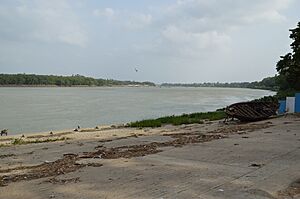
Chandannagar is located at 22°52′N 88°23′E / 22.87°N 88.38°E. It is about 9 meters (30 feet) above sea level.
The city is mainly divided into three parts: Khalisani (west), Gondalpara (south), and Boro (north). There are many smaller areas within these parts.
Chandannagar is surrounded by Chinsurah to the north, Bhadreswar to the south, the Hooghly river to the east, and Dhaniakhali to the west.
Police Services
The Chandannagar police station looks after the Chandernagore Municipal Corporation area. The Chandannagar Police Commissionerate was set up on June 30, 2017, to help with better policing in the area.
Places to Visit
Many buildings in Chandannagar show a special mix of Indian and French building styles. These are similar to those found in Pondicherry, another former French area in India. Many of these old buildings need to be fixed up.
Chandannagore Strand
This is a lovely tree-lined walkway along the river. It's about 700 meters (0.4 miles) long and 7 meters (23 feet) wide. Many historic buildings are located here. It's a popular spot for both locals and visitors to walk, enjoy the breeze, and watch boats on the river. You can also find the Vivekananda Mandir, a meditation center, along the Strand.
Chandernagore Museum and Institute
The Chandernagore Museum opened in 1961. It has a unique collection of French old items. These include cannons used in the Anglo-French war and wooden furniture from the 1700s. The institute also offers classes to learn the French language.
The Sacred Heart Church
The Sacred Heart Church, Chandannagar is close to the Strand. A French architect named Jacques Duchatz designed it. The church was opened on January 27, 1884. This church is over 200 years old and shows the beautiful architecture from the French period. The remains of the Church of St. Louis are also interesting to see.
French Cemetery
This cemetery has 150 tombs and is located on Grand Trunk Road. Important people buried here include Duplessis, who helped start French Chandannagar. You can also find the tomb of Henry "Storm" Piddington, a famous meteorologist.
Chandannagar Gate
This gate was built in 1937 to remember the Fall of Bastille, a big event in French history. It has the famous French Revolution slogan: "Liberté, égalité, fraternité" (Liberty, equality, fraternity).
The Underground House (Patal-Bari)
This building is a great example of old architecture. Its lower floor gets covered by water when the river level rises during the monsoon season. The famous poet Rabindranath Tagore often visited this place. He felt it helped him think and grow. He even wrote about Patal-bari in some of his novels. The well-known social reformer Iswar Chandra Vidyasagar also stayed here.
Nandadulal Temple
The Nandadulal Temple was built in 1740 by Indranarayan Roychoudhury. It shows amazing examples of ancient Indian sculptures. There are also many other beautiful temples dedicated to Kali, Shiva, and other gods, showing great artistry.
Nritya Gopal Smriti Mandir
Harihar Sett built this building and gave it to the people of Chandannagar. It is still used as a theater hall and a library. It was the first of its kind in the area. It has one of the largest collections of books in French, English, and Bengali in the district.
Bishalakshmi Temple
This temple is located in the western part of the city, near Brahmin para, Boubazar. The history of this old temple is not fully known, but local people regularly worship the deity here.
Sabinara Thakurbari
This is a temple dedicated to Lord Jaggannath, the Lord of the universe. It is on 'Rather Sadak', which means the road of Lord Jaggannath's chariot. It is believed that Mahaprabhu Chaitanya visited this place a long time ago.
KMDA Park
The KMDA Park is west of the Chandannagar Railway Station. It's a popular park and a great place for picnics. It opened in 2002 and many people visit, especially in winter.
The Mango Gardens
These mango gardens are now privately owned. They are popular spots for picnics, located west of the railway station near Mankundu. They have been open since 2009, and many people come here for winter day trips. Some of these gardens are called Amrapali and Amrakunja.
Festivals and Culture
In the month of Shravan (around July-August), Bhuvaneshwari Puja is celebrated at Hatkhola for a whole month.
A very important festival in Chandannagar is Jagaddhatri Puja. It happens in November, about 10 days after Diwali. The idols of Goddess Jagaddhatri are huge, almost three times taller than the Durga Puja idols in Kolkata. From the fifth day (Panchami) until the tenth day (Dashami), the whole city lights up with beautiful decorations made by local artists. On Dashami night, all the major puja groups bring their idols in a grand procession. It's one of the largest processions in the world, after Rio's Samba festival! Some of these pujas are very old, with "Adi Maa" being over 300 years old.
The history of Jagaddhatri Puja in Chandannagar is not fully known. It is believed that Indranarayan Choudhury, a wealthy person from Chandannagar, performed Jagaddhatri Puja at his home. Later, in 1790, the community Jagaddhatri Puja started. Lakshmiganj, a part of Chandannagar, was once called the 'Granary of Bengal' by Robert Clive. The Jagaddhatri Puja at Chaulpatty (Rice Market) in Lakshmiganj is likely an old example of this community celebration.
Getting Around
By Road
Chandannagar is about 37 km (23 mi) from Kolkata by road. You can take State Highway 6/ Grand Trunk Road, which goes through the city, or Delhi Road on the western side. Buses, taxis, and private cars are easily available. A new bridge over the railway tracks connects the eastern and western parts of the city.
By Rail
Chandannagar railway station serves the area. Local trains from Howrah station run very often, about every 10-12 minutes. The journey from Howrah takes about 50-55 minutes. Some express trains also stop here.
By Bus
Chandannagar has good bus connections. West Bengal Transport Corporation buses run from Esplanade Bus Stand in Kolkata to Chandannagar. Many private buses also connect Kolkata and Chandannagar.
By Air
The closest airport is Dumdum/Kolkata Airport, which connects to major cities in India and around the world. Chandannagar is only about 40 km (25 mi) from the airport by road.
By Water
The Government of West Bengal runs boat services on the Hooghly River. You can travel to Jaggaddal across the river and also between Chandannagar, Kolkata, and Belur.
Education
Chandannagar has many schools and colleges.
Schools for Boys
- Sri Aurobindo Vidyamandir
- Pearl Rosary School (WBBSE, WBCHSE)
- Adarsa Shikshalaya (WBBSE, WBCHSE)
- Chandernagore Kanailal Vidyamandir( Eng. Sec.) (WBBSE, WBCHSE)
- Chandernagore Kanailal Vidyamandir( Fr. Sec.) (WBBSE)
- Durga Charan Rakshit Banga Vidyalaya (WBBSE, WBCHSE)
- Prabartak Vidyarthi Bhaban (WBBSE)
- Ganges Gurukul (Coed) (ICSE + ISC)
- Khalisani Vidya Mandir (WBBSE)
- Narua Siksha Niketan (WBBSE)
- Modern Public School, Bhakunda (co ed)
- Chandannagar St. Paul's
- Rishi Aurobindo Bal-Kendram, Vidyalanka (Co-Ed)
- Vivekanand Wisdom Mission (Co-ED)
- Chandannagar Banga Vidyalaya (WBBSE, WBCHSE)
- Nritya Gopal Model High School (WBBSE)
Schools for Girls
- St. Joseph Convent
- Krishna Bhabini Nari Shiksha Mandir (WBBSE, WBCHSE)
- St. Anthony's High School (WBBSE, WBCHSE)
- Lal Bagan Balika Vidyalaya (WBBSE)
- Ushangini Balika Vidyalaya (WBBSE, WBCHSE)
- Prabartak Nari Mandir (WBBSE)
- Indumati Girls High School (WBBSE)
- Khalisani Nari Siksha Mandir (WBBSE)
- Ganges Gurukul (Coed)(ICSE + ISC)
- Bholanath Das Balika Vidyalaya
- Modern Public School, Bhakunda (co ed)
- Rishi Aurobindo Bal-Kendram, Vidyalanka (Co-Ed)
Colleges
- Chandernagore Government College (University of Burdwan)
- Khalisani Mahavidyalaya (University of Burdwan)
- Institute of Education (P.G.) for Women, Chandannagar (University of Burdwan)
- Women's Polytechnic College
- Sir J. C. Bose School of Engineering, Mankundu
City Population
Based on the 2011 Census of India, Chandannagar had a total population of 166,867 people. Out of these, 84,009 were males and 82,858 were females. About 11,826 people were under 6 years old. A large number of people, 139,005 (or 89.65% of those over 6), could read and write.
Languages Spoken
Famous People from Chandannagar
- Radhanath Sikdar: An Indian mathematician famous for calculating the height of Mount Everest.
- Kanailal Dutta: A Bengali revolutionary and martyr.
- Rash Behari Bose: A Bengali revolutionary.
- Motilal Roy: A Bengali revolutionary, journalist, and spiritual leader.
- Shrish Chandra Ghosh: A Bengali revolutionary.
- Manindra Nath Nayak: A Bengali revolutionary.
- Basabi Pal: A Professor of French.
- Tapas Paul: A Bengali actor and Member of Parliament.
- Ishan Porel: An Indian Under-19 and Bengal (CAB) cricketer.
Local Food
Chandannagar is well-known for its special sweet called Jolbhora Talsash Sondesh.
Images for kids
See Also
 In Spanish: Chandernagor para niños
In Spanish: Chandernagor para niños


